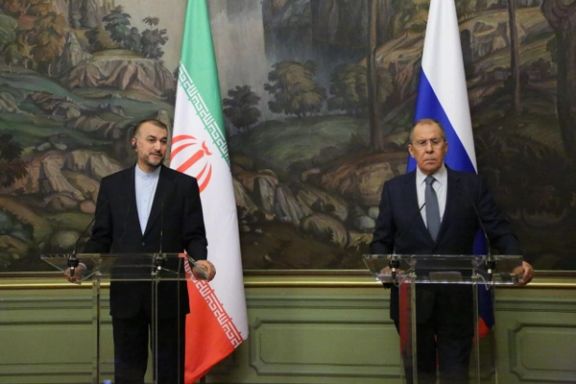Russian-Iranian Talks In Moscow Cover Regional, Nuclear Issues

The Iranian and Russian foreign ministers held wide-ranging talks in Moscow, covering bilateral cooperation, regional tensions and Iran’s nuclear talks.

The Iranian and Russian foreign ministers held wide-ranging talks in Moscow, covering bilateral cooperation, regional tensions and Iran’s nuclear talks.
Iranian Foreign Minister Hossein Amir-Abdollahian said Iran and Russia should work towards improving their relationship.
"Our viewpoints are very common and close to each other. A major part of the time of our talks was spent on bilateral issues. We agreed on working up a comprehensive strategic document on the cooperation between the two countries in near future," Amir-Aabdollahian said at a press conference with Russian Foreign Minister Sergey Lavrov in Moscow on Wednesday.
Russia has been Iran’s diplomatic supporter and a military ally in Syria where Russian air power and Iran-backed forces helped largely defeat opponents of Bashar al-Assad.
On Azerbaijan, he said Iran discussed its concerns with Lavrov. "We believe the region cannot tolerate new excessive demands," the Iranian foreign minister told reporters.
Tensions have risen between Iran and the Republic of Azerbaijan in recent weeks as Baku has hampered Iranian trucks traveling north in a small patch of territory it controls. Tehran has lashed back with military drills on the border and accusations that Baku has allowed Israel to establish a presence near its borders.
Amir-Abdollahian expressed concern over what he said was Israel’s presence and influence in neighboring Azerbaijan.
The two sides also discussed Iran’s talks with world powers over its nuclear program that Tehran has suspended since June. Lavrov echoing Western calls said that the nuclear negotiations in the "Vienna format" should be resumed "as soon as possible".
Washington pulled out of the deal unilaterally in 2018 under US President Donald Trump, but successor Joe Biden has indicated that the US would be willing to rejoin.
But there are complications. Iran has been steadily violating the restrictions of the deal, like the amount of enriched uranium it can stockpile and the purity to which it can enrich it. Lavrov also urged closer cooperation between Iran and the International Atomic Energy Agency.
On the settlement in the Caucasian region, Lavrov said Moscow was discussing the so-called 3+3 format.
"We discussed an initiative to create the format 3+3: three Transcaucasian countries and three big neighbors - Russia, Iran and Turkey. Iranian friends have a positive view regarding this initiative, and we can see the same feeling in Azerbaijan and Turkey," Lavrov said.
"We work with our Armenian colleagues. We believe that Georgia, despite all the problems it faces, will be interested in such a mechanism of consultations," Lavrov added.
Russia brokered a peace deal between Armenian and Azerbaijan last November, ending last year's six-week war with Azerbaijan.
The deal ceded large swathes of territory in Azerbaijan that had been controlled by Armenian forces since 1994 and was a severe blow to Armenian nationalists' pride.